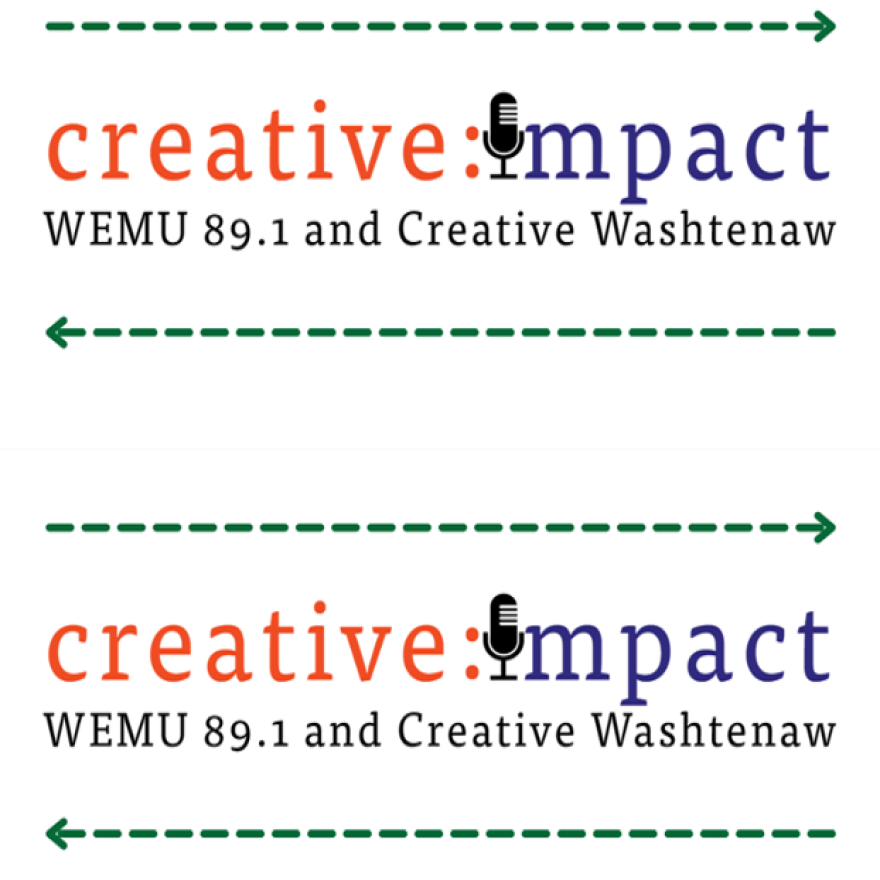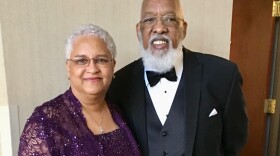Creative industries in Washtenaw County add hundreds of millions of dollars to the local economy. In the weeks and months to come, host Deb Polich, the President and CEO of Creative Washtenaw, explores the myriad of contributors that make up the creative sector in Washtenaw County.

RESOURCES:
Michigan Cultural Advocacy Day
Michigan Cultural Advocacy Day Registration
TRANSCRIPTION:
David Fair: This is 89 one WEMU. And I'd like to welcome you to this week's edition of creative:impact. Voice sound different? I'm David Fair, and I'm filling the seat normally occupied by Deb Polich. She is the president and CEO of Creative Washtenaw and your regular host for creative:impact. But, today, we've made Deb slide over a chair, and she's serving as the guest.
Deb Polich: I'm in the guest seat today. Good morning.
David Fair: It is musical chairs on WEMU. So, Deb, the reason we're getting together today is because there is an extraordinary opportunity for the community to get together with our state representatives and our state senators to talk about advocacy for the arts and the impacts of arts in our community.
Deb Polich: Yeah. The Michigan Cultural Arts Network hosted Arts Advocacy Month in March, so there's a number of events and the culmination of those programs where we sometimes as people in the field learn new things and look at legislation that can be important to the arts and throughout the state of Michigan, it all culminates with us having meetings with our members, those elected officials from Washtenaw County, generally in Lansing, or the last few years by Zoom, to talk about those issues and also to find out what their positions are.
David Fair: So, now we can do it in person?
Deb Polich: Well, so Washtenaw County, because of Creative Washtenaw's leadership, frankly, and our general relationship with our elected officials here in this county. We're holding a joint meeting of all the state legislators and state representatives that get elected here in Washtenaw County at one time on March 17th at 8:30 in the morning, so that we can just have a meeting and have a full-fledged conversation.
David Fair: That is a Friday morning, March 17th. And, of course, it will be open to the public. Now, we mentioned all that is going to be there in terms of the elected officials. What about the artists themselves? Are they invited? Are we going to get an opportunity to kind of meet with, talk with, and find out what's important to them?
Deb Polich: Yeah, this is a typical thing that we do for advocacy days, either on the state level or on the national level. We extend invitations out, we do some training, we provide some materials. We want people to understand that these are our elected officials, and they're very open, our elected officials, I will say, to having these conversations and meeting up with people. So, absolutely. Artists and creatives and people that work in the field here in Washtenaw County are invited to this. Others can attend too: people in education and other ways and who touch the arts and find that it's an important part of our community.
David Fair: We've each said "creative" several times. I want to get to the impact part of things. The pandemic was difficult on every aspect of the community, particularly the arts and cultural community. Are we coming out of that? And are we starting to see a return to the levels of financial and economic impact that the arts community held for Washtenaw County prior?
Deb Polich: I think I'd answer that by saying we're functioning. We are certainly, certainly nowhere near where we were prior to the pandemic. If you talk to people that track audiences, they're somewhere at 60 to 70% of the audience. A couple of things I think have come to play: folks just kind of got out of the habit of going out and doing cultural things. Some are still fearful for health reasons, and we just really have not come back to that. Will we? It's hard to say. Certainly, I know everybody, not everybody, but I know a lot of organizations that are trying to look at what is going to be the new normal and how can they bring people and encourage people to come back to their audiences, to their venues. Now, I will say that there are certainly some things that completely sell out, and there doesn't seem to be quite a rhyme or reason at this moment. So, we're all trying to figure it out.
David Fair: You are listening to creative:impact on 89 one WEMU, I'm David Fair, alongside your real host and content creator Deb Polich as we discuss the upcoming Michigan Arts and Cultural Advocacy Day and the year-round implications for Washtenaw County. So, as an advocate for the arts and cultural community, as you start to process this data, how are you going to advocate to return us to the economic and social impacts?
Deb Polich: Well, thank you for asking. It's a good question. You know, advocacy days typically for decades wrapped around public funding for the arts. Now, this, on the national level, for the National Endowment for the Arts or Michigan Council for the Arts, now known as Michigan Arts and Culture Council. Funding....you know, Michigan used to be at the highest, one of the highest, at $27 million, and we dropped down significantly. We're now back up, I think, to $17 million. That'll be part of the conversation. But we are very interested in policy as well. For example, you and I have talked in our years about the importance and the impact of the creative industries in Michigan that were an $18 billion industry pre-COVID, and that there are great jobs, good jobs, in this industry. Yet, we're not really wrapped into the Michigan Economic Development Corporation or the LEO offices. And the governor just sent out an invitation to people to apply for positions on those boards at MEDC and various sectors are named in there at manufacturing or health or whatever. The arts and creative industry is not on that list. We want to be on that list. We think there should be a seat for us. Another thing is that, in the nonprofit world, I'm going to find out when this law was written, but half a million dollar floor is when an organization needs to have or half a million dollars worth of donations is when an organization is required by the state to do an audit. That was probably written decades ago. Half a million dollars these days in funding is important, but it's not a ton of money while an audit costs somewhere between ten and $15,000. It's a huge chunk of somebody's budget when you're only running a $700,000 organization and you've got staff to pay. So, you know, what can we do to change that? They may not seem really important, but it's really important.
David Fair: Does that, though, then open up all of these funding mechanisms and donations to abuse, to corruption, if you're not doing a regular audit?
Deb Polich: Oh, gosh. You know, no. So, the fact is is that the fraud in the arts and cultural community or the nonprofit world--I'll just say this straight out--is nowhere as much as people think it is or could be. It always gets a lot of attention when somebody does cause fraud. And we are--most of us are--very, very protective of our funding and make sure that we follow donors' intent and everything else. But, you know, especially the big, big, huge fraud issues, you know, certainly capture the attention of the media. So, no. There's so many checks and balances. So many checks and balances.
David Fair: Once again, this is 89 one WEMU's creative:impact. We're talking about the impact of arts and culture in our community as we approach Michigan Arts and Cultural Advocacy Day. And, Deb, one of the things we've also talked about in the past that probably needs to continue to be addressed is that things get focused on the federal level, on the state level, but a lot of municipal governments don't have the budgets or the time and energy to deal with arts and cultural issues. Is that something you're starting to see become more prevalent?
Deb Polich: You know, I'm going to say that the work that our colleagues have done over the years is starting to pay off. It's like that flywheel is starting to move. We get calls from members, elected members, to find out, you know, how they might consider doing something one way or the other. It's not solved for sure. But there's an awareness that, I think, you know, it's a drip, drip, drip kind of thing. You know, you just got to keep working at it and working at it.
David Fair: So, we've approached it from a couple of different levels. It's about inclusion, and it seems as though arts and cultural issues are not always included in state policy, federal policy, or local policy. And as you continue the path of advocacy, how do you make that message heard and then implemented?

Deb Polich: Good question. So, it's constant communication. It's constantly, you know, bringing awareness to our elected officials and those that are running for office about the importance and how it's an ecosystem. You know, no other sector exists without arts and creativity, whether that's manufacturing, whether it's health, or whatnot. And we all need to to look at that holistically. And so, that's the work that we're doing. We point out that we've got facts, we've got data, we've got stories, we've got, you know, those that have been impacted by it that really can make the change.
David Fair: So, what do we lose as a community? What do we lose as individuals if we don't take those next steps?
Deb Polich: Well, the point is, is that it's what we gain. You know, this is an under-resourced field, this instability. COVID, you know, hit that right on the head. And what we gain really by engaging with and having this industry part and parcel to the rest of the ecosystem is that we're stronger. More people can have access, more people can be engaged, more education can take place, more skills can be learned. And, economically, you know, it's an important economic driver. It already is.
David Fair: Well, Deb, it's been a long time since you sat in the guest chair on creative:impact. How do you like it on those on that side of things?
Deb Polich: You know, it's kind of fun, David, but I really, really appreciate you wanting to know more about this advocacy week--month, I should say--and asking us to do this. It's kind of fun.
David Fair: Yeah, it was. It was. So, well, next week, Deb will be back in her regular spot as host of creative:impact, and we'll be able to spare you my voice and presence. Deb, as always, we'll look forward to your next creative:impact conversation.
Deb Polich: Absolutely. We love all the creatives here in Washtenaw.
David Fair: For more information on today's topic and to visit the creative:impact archive, just go to our website at WEMU dot org. I'm David Fairm and I thank you for spending some time with us for creative:impact today. This is your community NPR station. 89 one WEMU FM, Ypsilanti.

Non-commercial, fact based reporting is made possible by your financial support. Make your donation to WEMU today to keep your community NPR station thriving.
Like 89.1 WEMU on Facebook and follow us on Twitter
Contact WEMU News at 734.487.3363 or email us at studio@wemu.org








